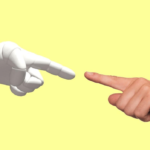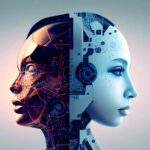The Future of Work: AI and Job Automation
The future of work is undergoing a significant transformation driven by advances in AI (Artificial Intelligence) and automation technologies. While these technologies have the potential to increase productivity, reduce costs, and create new opportunities, they also raise concerns about job displacement and the need for upskilling and workforce adaptation. Here are key points to consider regarding the future of work in the context of AI and job automation:
Job Displacement and Transformation:
- Automation, including AI-driven automation, is likely to replace certain repetitive, routine tasks across various industries. This may lead to job displacement in specific roles and functions.
- Some jobs may be transformed rather than eliminated, with automation handling routine tasks while humans focus on higher-level tasks that require creativity, critical thinking, and emotional intelligence.
New Job Creation:
- The adoption of AI and automation can lead to the creation of new job roles, particularly in areas related to AI development, data analysis, cybersecurity, and robotics maintenance.
- The growth of AI-related industries can also stimulate job creation in fields like machine learning, natural language processing, and computer vision.
Skill Requirements and Upskilling:
- As job roles evolve, there will be a growing demand for skills related to AI, data analysis, digital literacy, and problem-solving.
- Lifelong learning and upskilling will become essential for individuals to remain competitive in the job market and adapt to changing workplace dynamics.
Human-AI Collaboration:
- The future of work is likely to involve more collaboration between humans and AI systems. Workers may use AI tools to enhance their productivity and decision-making.
- The ability to effectively work alongside AI will become a valuable skill.
Redefining Work Environments:
- Remote work, flexible schedules, and gig work arrangements have been accelerated by technology, including AI-powered communication tools.
- AI-driven monitoring and productivity-enhancing technologies may further redefine how and where work is conducted.
Ethical and Societal Considerations:
- As AI and automation become more integrated into the workplace, ethical considerations related to bias, transparency, and accountability will become increasingly important.
- Society will need to address issues related to job displacement, income inequality, and social safety nets for workers impacted by automation.
Policy and Regulation:
- Governments and organizations will need to develop policies and regulations that address the impact of AI and automation on the workforce.
- These policies may include measures for workforce retraining, income support during transitions, and guidelines for AI ethics and safety.
In conclusion, the future of work in the age of AI and automation is characterized by both opportunities and challenges. While automation may disrupt certain job roles, it also has the potential to create new opportunities and enhance productivity. A proactive approach to workforce development, upskilling, and ethical considerations will be essential to ensure that the benefits of AI and automation are widely shared and that the workforce is prepared for the changing nature of work.


